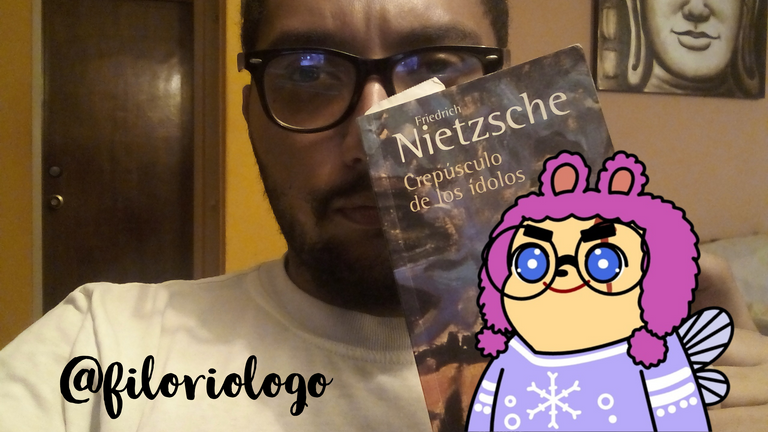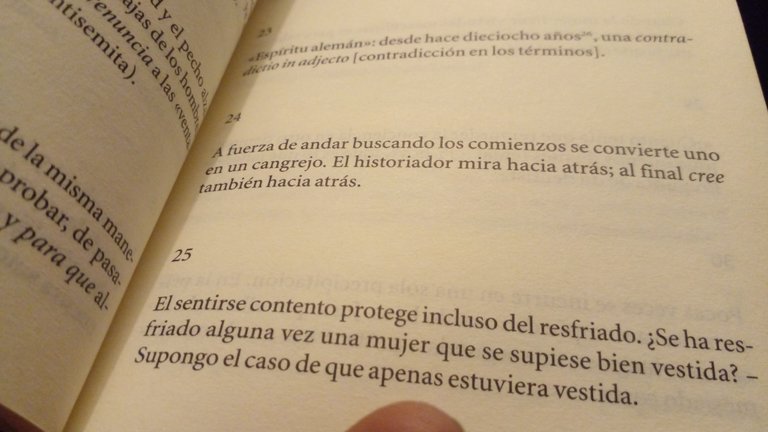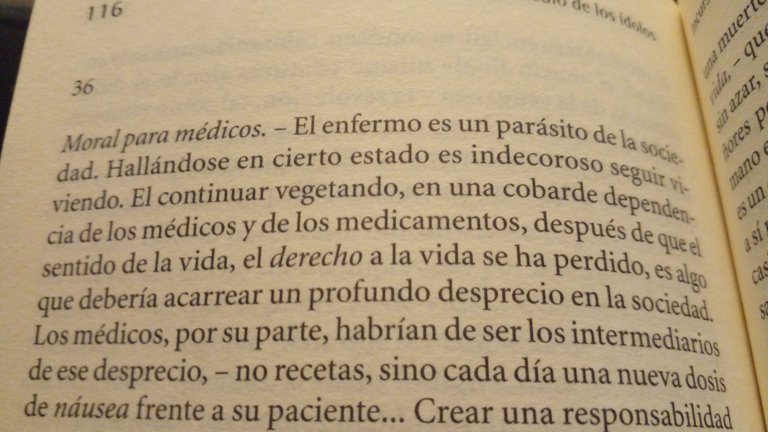
Talking about Nietzsche is not easy for me, since I feel it is a real responsibility to be able to express my ideas as clearly as possible, since Nietzsche himself is an extremely interesting author, not for nothing is he known as the philosopher of the Hammer. Well, precisely the book I want to mention today is called "The Twilight of the Idols or how to philosophize with the hammer". Before entering the subject itself, I must warn that I do not intend to make an approach to the text, but what matters to me is to expose my experience with the book, trying to shed light on its content and invite you to read it, but first let's talk about what can be understood as the image of the hammer. It is necessary to ask ourselves.
What is a hammer for?
Perhaps the first answer that may jump to our minds is that with a hammer we give blows, but the blows have a purpose, in principle two purposes, to destroy and to nail. And this is an interpretation that we can make of the book and of the whole Nietzschean philosophy.

The Fall of the Idols is a book that personally could be conceived as an introduction to the whole philosophy of the German philologist with the terrifying moustache. I think, if you have never read Nietzsche, and wish to approach his work, do it starting with this text, because it seems to be an anthology of his ideas, being at the same time jovial and aggressive. As a curious fact about the book, at the beginning it was not called "Twilight of the Idols" but it was titled "Idleness of a Psychologist", and what he wanted was to write a sort of philosophical compendium about him. Personally, I think he succeeded. Now, the change of title is due to Nietzsche's open attack against Wagner.
Regarding the content of the text, I must say that it is divided into 10 sections, not to call them chapters. Each one with its own richness, one of my favorites is the first part, since it offers us 44 aphorisms, which are undoubtedly among the most brilliant aphorisms of his career. In the second section he exposes his ideas about the person of Socrates, and we cannot hide that there is an evident contempt on the part of Mr. Moustaches towards the maieutic satyr.
In the third section he talks to us about the task of the philosopher and about philosophy, a section that I find very interesting. In the following sections he makes an attack on morality, and in section six he comments on those psychological errors that end up damaging morality. And so goes our German author exposing his ideas, and presenting us his interpretations, in a brief way, making of this text a book that condenses a good part of the Nietzschean substantiality, and that is not extensive at all, each section is somewhat summarized. Personally, I must confess that I admire Nietzsche's ability to say so much in so few words. But as a curious fact, he did not do it because it was something that gave him pleasure, or maybe he did, but in principle his aphoristic way of writing is due to a condition, a condition in his state of health.

It turns out that Friedrich Nietzsche suffered strong migraines, which led him to read very slowly and could not have many hours of continuous reading, and could not write too much, so I think it can be said that the aphoristic style of Nietzsche, partly due to his health condition, although I also think he must have fallen in love with Heraclitus, because of all the thinkers of antiquity, Heraclitus was the one he most admired and respected. And in this text "Ocaso de los ídolos" he reminds us of it.
I always recommend a good publisher when you want to make a good reading, because we can find resources that other editions would not have. Personally, I acquired the book from the Spanish publisher "Editorial Alianza" which is undoubtedly one of the best in philosophy. And especially this edition that I own, which you can see in the pictures, contains notes and comments by Andrés Sánchez Pascual, who has devoted himself to read and study Nietzsche.
I really thank you for your time and attention in visiting my blog...

VERSIÓN EN ESPAÑOL
Sobre el “El Crepúsculo de los Ídolos” de F. Nietzsche
Hablar de Nietzsche para mí no es nada fácil, ya que siento que es una verdadera responsabilidad poder expresar mis ideas con la mayor claridad posible ya que en sí mismo, Nietzsche resulta ser un autor sumamente interesante, no por nada se le conoce como el filósofo del Martillo. Pues, precisamente del libro que les quiero mencionar hoy se llama “El crepúsculo de los ídolos o cómo se filosofa con el martillo”. Antes de entrar en el tema en sí, debo advertir que no pretendo hacer una aproximación al texto, sino que lo que me importa es exponer mi experiencia con el libro, intentando dar luces de su contenido e invitar a su lectura, pero, primero hablemos de eso que se puede entender como la imagen del martillo. Haciendo preciso preguntarnos

¿Para qué sirve un Martillo?
Quizá la primera respuesta que puede saltar a nuestras mentes es que con un martillo damos golpes, pero los golpes tienen un propósito, en principio dos propósitos, destruir y clavar. Y esta es una interpretación que podemos hacer del libro y de toda la filosofía nietzscheana.
El ocaso de los ídolos es un libro que personalmente podría ser concebido como una introducción a toda la filosofía del filólogo alemán con bigote aterrador. Pienso, que si nunca has leído a Nietzsche, y deseas acercarte a su obra, lo hagas comenzando con este texto, porque parece ser una antología de sus ideas, siendo a la vez jovial y agresivo. Como dato curioso sobre el libro, al comienzo no llevaba el nombre de crepusculo de los ídolos sino que se titulaba, “ociosidad de un psicólogo”, y lo que buscaba era escribir una suerte de compendio filosófico en torno suyo. Personalmente creo que lo logró. Ahora bien, el cambio de título se debe al abierto ataque de Nietzsche contra Wagner.
Sobre el contenido del texto debo decir que está dividido en 10 apartados por no llamarlos capítulos. Cada uno con una riqueza propia, de mis favoritas es la primera parte, ya que nos ofrece 44 aforismos, que sin duda son de los aforismos más brillantes de su carrera. En el segundo apartado nos expone sus ideas sobre la persona de Socrátes, y no podemos ocultar que hay un evidente desprecio por parte del señor bigotes hacia el sátiro mayéutico.
En el tercer apartado nos habla sobre la tarea del filósofo y sobre la filosofía, apartado que para mí, resulta muy interesante. En los apartados siguientes hace un ataque a la moral, y en el apartado seis nos comenta de esos errores psicológicos que terminan perjudicando a la moral. Y así va nuestro autor alemán exponiendo sus ideas, y presentándonos sus interpretaciones, de manera breve, haciendo de este texto un libro que condensa una buena parte de la sustancialidad Nietzscheana, y que no es nada extenso, cada apartado es algo resumido. Personalmente debo confesar que admiro la capacidad que tiene Nietzsche para decir tanto en tan pocas palabras. Pero como dato curioso, no lo hacía porque era algo que le cause placer. o bueno quizá sí, pero en principio su modo aforístico de escribir se debe una condición, una afección en su estado de salud.

Resulta que Friedrich Nietzsche sufría fuertes migrañas, cosa que le llevó a leer muy lento y no podía tener muchas horas de lectura continua, y tampoco podìa escribir demasiado, así que creo que se puede afirmar que el estilo aforístico de Nietezsche, en parte se debe a su condición de salud, aunque también creo que tuvo que haber quedado prendado de Heráclito, ya que de todos los pensadores de la antigüedad, Heráclito era el que más admiraba y respetaba. Y en este texto “Ocaso de los ídolos” nos lo recuerda.
Recomiendo siempre una buena editorial cuando se quiere hacer una buena lectura, ya que podemos encontrarnos con recursos que otras ediciones no contariamos. Personalmente, adquirí el libro de la editorial española “Editorial Alianza” que sin duda alguna es de las mejores en filosofía. Y en especial esta edición que poseo, y que la pueden ver en las fotos, contiene notas y comentarios de Ándres Sánchez Pascual, quien se ha dedicado mucho a leer y estudiar a Nietzsche.
En verdad les agradezco su tiempo y atención al visitar mi blog…

The rewards earned on this comment will go directly to the people(@filoriologo) sharing the post on Twitter as long as they are registered with @poshtoken. Sign up at https://hiveposh.com.
Un buen trabajo de presentación del libro. Me hubiera gustado encontrar más de tu experiencia como lector de él. Pienso que la inclinación o preferencia de Nietzsche por la escritura fragmentaria atiende, fundamentalmente, a una cuestión de tradición en el pensamiento. Por ejemplo, fue lector del gran maestro del aforismo, Lichtenberg. Nietzsche será siempre una pasión inacabada. Saludos, @filoriologo.
PD: Si me permites una sugerencia, recomiendo -siguiendo las normas APA- escribir los títulos de los libros en cursiva, o, en su defecto, en negrita.
Gracias por el consejo, ciertamente debí colocar los titulos en cursiva, lo editaré apenas termite este comentario. Sus palabras son bien recibidas. Pues, la experiencia como lector de Nietzsche al comienzo fue todo un reto, tenía como 19 años y era estudiante religioso y el primer texto que me aventuré a leer fue El Anticristo, y fue rudo ya que hay ciertas afirmaciones que son verdaderamente impactantes, por ejemblo: "...hay animales domésticos como el perro, hay animales salvajes [...] y hay animales enfermos, a estos se les conoce como cristianos." Eso a mi me chocó, pero no me quedé con solo la lectura del anticristo sino que fuí acercandome a otros textos y me volví un curioso sobre Nietzsche, aunque aun hay textos que no he leido como "Consideraciones Intempestivas" o "Voluntad de poder".
Y al llegar a El Crepúsculo de los idiolos sentí que era una especie de compendio a todo lo que de algun modo ha dicho en otros textos. De nuevo muchas gracias por su comentario estimado @josemalavem Saludos!!!
¡Felicidades! Esta publicación obtuvo upvote y fue compartido por @la-colmena, un proyecto de Curación Manual para la comunidad hispana de Hive que cuenta con el respaldo de @curie.
Si te gusta el trabajo que hacemos, te invitamos a darle tu voto a este comentario y a votar como testigo por Curie.
Si quieres saber más sobre nuestro proyecto, acompáñanos en Discord: La Colmena.
Your content has been voted as a part of Encouragement program. Keep up the good work!
Use Ecency daily to boost your growth on platform!
Support Ecency
Vote for new Proposal
Delegate HP and earn more
You're doing great🥰
Wow, this is well written.
I don't think I will be able to articulate Nietzsche's work well. He is a man of incredible intellectual prowess
No doubt about it. With the time I've been reading some of his works, because I haven't read them all. I have learned to go slowly through his ideas, because many of them can be like double-edged razors. He is extremely intelligent. For me an intellectual to admire. Clearly with some shortcomings with respect to his person, but that is another story.
Thanks for commenting @stevenson7